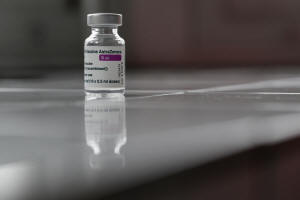France opts for mRNA vaccines for second coronavirus shot
 Send a link to a friend
Send a link to a friend
 [April 09, 2021]
By Sudip Kar-Gupta and Benoit Van Overstraeten [April 09, 2021]
By Sudip Kar-Gupta and Benoit Van Overstraeten
PARIS (Reuters) - France's top health
advisory body in charge of COVID-19 vaccines recommended on Friday that
recipients of a first dose of the AstraZeneca shot who are under 55
should receive a second dose with a so-called messenger RNA vaccine.
Reuters reported on Thursday that the Haute Autorite de la Sante (HAS)
had opted for the dose-mixing recommendation, which has not yet been
evaluated in trials.
The French decision came after European drug regulators said on
Wednesday there was a possible link between AstraZeneca's COVID-19 shot
and a very small number of cases of rare blood clots.
Some countries had already suspended use of the AstraZeneca vaccine as a
precaution, but most have resumed using the shot, although some have
done so with age restrictions.

"This is a logical choice and one of security," Dominique Le Guludec,
the head of the HAS, told reporters.
"Our approach is absolutely not to engage in a gigantic experimentation
on the French population...We actually want to be cautious and not
expose people to thromboembolic accidents, even though they are very
rare," she said.
Two mRNA vaccines, one from Pfizer and BioNTech and one from Moderna,
are approved for use in France.
mRNA vaccines prompt the human body to make a protein that mimics part
of the virus, triggering an immune response, while AstraZeneca's shot
uses a harmless, weakened version of a chimpanzee common-cold virus to
deliver instructions to generate an immune response and prevent
infection.
[to top of second column]
|

A vial of the Oxford-AstraZeneca COVID-19 vaccine is pictured at
the Foch hospital in Suresnes, near Paris, France, February 8, 2021.
REUTERS/Benoit Tessier

MORE STUDIES NEEDED
The HAS also called for real-world studies to assess the immune
response triggered by the mixed vaccination scheme.
It said its decision was based on an immunisation strategy known as
heterologous prime-boost, in which separate doses of different
effective vaccines are used to confer protection.
The HAS said that while there is little data yet available on using
different vaccines in a prime-boost strategy for COVID-19, animal
studies and evidence from other disease areas is encouraging.
A member of the German vaccine commission, Marianne Roebl-Mathieu,
said earlier this week she saw no immunological disadvantage for
younger recipients of AstraZeneca's vaccine in getting a second dose
of another vaccine.
In France, the HAS said on March 19 that only people aged 55 and
over should get the AstraZeneca shot, which had already been given
to more than 500,000 people as a first dose.
Germany was the first European country to recommend that people
under 60 who have had a first AstraZeneca shot should receive a
different vaccine as a second dose.
(Reporting by Sudip Kar-Gupta, Benoit Van Overstraeten; Writing by
Matthias Blamont; Editing by Kate Kelland and Mark Heinrich)
[© 2021 Thomson Reuters. All rights
reserved.] Copyright 2021 Reuters. All rights reserved. This material may not be published,
broadcast, rewritten or redistributed.
Thompson Reuters is solely responsible for this content. |